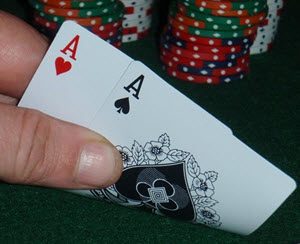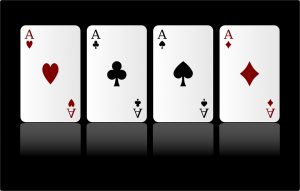- Limping in the early stage of the tournament with pocket aces.
Let's say you got lucky and received two aces in the early stage of the tournament. What should you do? The most important thing to understand is that our goal now is not to win the blinds; they are too small to make any impact on your chip count. Your aim should be to maximize the value you get while minimizing the risk. Try to choose your actions so that you are left with one or two opponents before the flop.
Example:
You get two black aces in middle position, everyone folds to you. The tournament is in the early stage, blinds are 25-50, and your chip count is 2000. Let's say you just call, the player in the dealer position also calls, and the big blind checks. These players have a similar amount of chips as you. The pot is 175 chips, you have risked 50 so far, but you have the opportunity to win 6000. The flop comes K – 9 – 2 of different suits. If one of your opponents has a hand like K-10, you have a great chance to win a big pot in this hand.
Example:
You get two aces in the first position (next after the blinds). The tournament is in the early stage, blinds are 25-50, and you have 2000. You just call, hoping that someone will raise, thinning the field. Also, if necessary, when it's your turn again, you could raise. Unfortunately, seven players call the bet. The pot is 350. Be prepared to fold. The flop comes K – 10 – 2 with two hearts. Although you have an overpair, you have almost no chance of winning this hand. This flop has two cards from the so-called playable zone (often described as any card from ace to nine), including two cards that make a flush draw and two cards that make a possible straight draw. Besides, someone could have called with a pair of twos and would now have three of a kind. Although you may feel very frustrated that you can't win with your pocket aces, you need to fold them. It's essential to learn to put aces back in the deck in these situations.
Example:
You got a pair of aces in the dealer position. Early stage of the tournament, blinds 25-50, your chip count is 2000. A player in middle position, who has 2500 chips, raises to 200. Everyone else folds to you, and in this situation, you have two choices:
- Raise again. If you raise again, the most common result of this action will be the opponent folding their cards. If they have a strong hand like pocket kings, they will probably re-raise, and you will want to risk all your chips.
- Call the bet. Most players would re-raise in this spot, but why not try just calling and taking a risk.
Example:
You get two black aces in the dealer position. The blinds are 10-25, your chip count is 2000. Three people have called the blind before you, the pot is 110 chips, and since you don't want to see the flop with so many opponents, you raise to 110. You get a call from only one player. A great situation for you to win a big pot.
- Limping in the early stage of the tournament with pocket kings or queens.
The goal with these hands is the same as with aces; you call the bets to get the maximum possible profit with the least possible risk. Again, you want to take actions that leave you with no more than two opponents in the hand. Of course, the weaker your hand, the greater the risk. Suppose you have a pair of queens; the probability that a king or ace will appear on the flop is almost 40%. Most players are reluctant to risk when they get a high pair; they hope their opponents have a strong hand and can later win the pot by re-raising.
Tip: If you don't trust your ability to read your opponent's hand, don't limp with aces or kings.
It takes time and experience to be able to read your opponents. If you are not confident, don't play passively with these hands. You could get into big trouble if you are outflopped. It's better to raise and re-raise if the bets have already been raised, thus reducing the number of players in the pot and making it easier for you to make further decisions.
Tip: Do you hate pocket jacks?
Playing with a pair of jacks is very difficult to do correctly because 65% of the time, there will be at least one card higher than a jack on the flop. Often people say: “I hate those damn jacks!”
If you just call the blind with a pair of jacks in the early stage of the tournament, you can easily get out of the pot if a higher card appears on the flop. However, pocket jacks are too vulnerable a hand to limp with. Raise to reduce the number of opponents and play cautiously after the flop. If two higher cards appear, just fold and play the next hand. If one higher card appears, well, be careful. After all, you only have those damn jacks!







